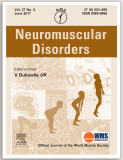 Little is known about the relationship between Becker Muscular Dystrophy (BMD) and mental disorders. This study aimed to clarify whether BMD is a risk factor for psychiatric diseases.
Little is known about the relationship between Becker Muscular Dystrophy (BMD) and mental disorders. This study aimed to clarify whether BMD is a risk factor for psychiatric diseases.
The authors asked genetically or immunohistochemically confirmed BMD patients to participate in the study interview. Participants who consented to psychiatric tests underwent further assessments of intellectual, psychological, and neurodevelopmental disorders. In total, 76 (73%) of 105 BMD patients (median age, 37 years) completed the interview. Of these, 6 had developmental disorders (mental retardation, pervasive developmental disorder), 33/76 (43%) experienced bullying in school, 11 exhibited problematic behaviors such as cutting class and violent incidents, and 16 had psychiatric disorders (schizophrenia spectrum, 5; depressive spectrum, 4; stress-related disorders, 3; obsessive-compulsive and related disorders, 2; somatic symptom and related disorders, 2; bipolar and related disorders, 1). Mean IQ was normal, whereas 13/40 (32.5%) of participants were in a depressive state. High trait anxiety was found in 20/40 (50%) of patients, while 15/40 (38.5%) were in an anxious state. Review of MRI data from 14 participants revealed brain atrophy caused solely by BMD and unrelated to any other complication.
These findings suggest that BMD patients are at risk of developing psychiatric disorders. Physical handicap or bullying may influence their mental state, as many of them have high trait anxiety. Parents, teachers, and supporters should be mindful of the daily environment of BMD patients and provide support to help them cope with stress.
